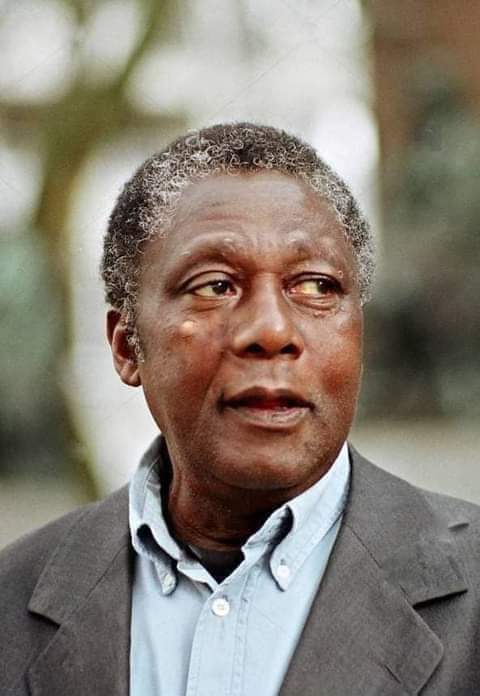
“The vocation of the writer is not to bless the world as it is, but to make society uncomfortable, to provide it with that bad conscience it needs to progress. It is necessary to provoke indignation, source of life and freedom.” Mongo Beti.
MONGO BETI is the writer, the intellectual who influenced me the most and structured my engagement through his writings.
Alexandre Biyidi Awala Alias Eza Boto orp Mongo Beti was born on June 30, 1932 in Akométan in Cameroon. Mongo Beti is his writer’s name. Mongo means “son,” and Beti is the name of his ethnic group. He is therefore the son of his people, of his land, of his country.
With his baccalaureate, Mongo Beti landed in France in 1951 where he pursued higher studies in Letters in Aix-en Province then at the Sorbonne in Paris.
Barely 21 years old, he published his first book in 1953, the short story “Without hate and without love”. In 1954, he published his first novel Cruel City, under the pseudonym Eza Boto. Novel in which he denounces the arbitrary and unjust system of colonialism. His literary career will be primarily that of an anti-colonialist writer.
In 1956, the novel The Poor Christ of Bomba appeared in which he described the colonial missionary world. Then appears Mission completed in 1957; book which aims to be a description of traditional Cameroonian society and its shortcomings. In 1958, Le Roi miraculé appeared. A relentless worker, Mongo Beti worked for the review Proof and taught at the high schools of Rambouillet and Henri Avril in Lamballe.
In 1966, he successfully passed his Agrégation de Lettres classique (Classics) and taught from that date until 1994 at the Lycée Corneille in Rouen. In 1972, his book Main basse sur le Cameroun, autopsie d’un décolonization. The book was immediately censored upon its release by an order of Raymond Marcellin, French Minister of the Interior at the request of Jacques Foccart and the Cameroonian government.
In 1974, Perperuate and Remember Ruben appeared. Mongo Beti was deeply marked from his youth by the personality of Ruben Um Nyobé. While still a student at Lycée Leclerc in Yaoundé, Mongo Beti regularly made the wall to go secretly listen to “Mpodol” the charismatic leader of the Union des Populations du Cameroon (UPC).
Mongo Beti founded in 1978 with his wife Odile Tobner, the bimonthly magazine Black Peoples African Peoples in which he denounces neocolonialism and allows young African intellectuals to express themselves. Throughout his existence, Alexandre Biyidi Awala denounced colonialism and neo-colonialism. He would have earned the nickname “The Anti [Neo] Colonialist”.
He believed that “the fight against colonialism or neocolonialism begins with the fight against the forces which, locally, serve as a relay for neocolonialism. Mongo Beti’s literary work is immense. He has notably published in addition to the works cited above: Ruine almost comical of a puppet in 1979, Les Deux Mères by Guillaume Ismaël Dzewatama future trucker in 1983, La Revanche by Guillaume Ismaël Dzewatama in 1984, France against Africa, return to Cameroon in 1993,: The history of the madman in 1994 then the first two volumes, Trop de soleil kills amour in 1999, Branle-bas in black and white (2000).
After thirty-two years of exile in France, Mongo Béti “the anti [neo] colonialist” returned to Cameroon in 1991. Noting that the book is a particularly rare commodity in this country, he decides to open a bookstore in Yaoundé. : “The Black Peoples Library”.
He helps villagers in his village of Akometam organize farming activities. He created associations for the defense of citizens and published numerous articles of protest in the private press. He campaigned for a free and objective press. A few months before his death he said: “To permanently clean up the Africa-France relationship, and prevent massacres and other genocides, it is above all necessary to free the actors of the French media from all the psychological, political and cultural inhibitions which have paralyzed them until now. As elsewhere, in developed and truly democratic countries, the day will have to come when a French journalist will speak objectively about Africa even if the facts contradict his ideology. “
“The anti [neo] colonialist” died on October 7, 2001.
Extract from my book: Nicknames of the men and women who have marked the history of Africa
By Arol KETCH 07/10/2020
Stray Magnan Ant